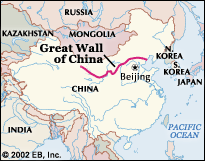Difference between revisions of "Great Wall of China"
(Semicolon again) |
(Readability/clarification) |
||
| Line 5: | Line 5: | ||
Work on the wall started in 500 BC during the rule of the first Chinese emperor, [[Qin Shi Huang]], and continued for 2,000 years. Most of the work was done during the [[Ming Dynasty]]. At regular intervals towers were built; at first they functioned purely as watchtowers but later on they were modified to include [[cannon]]s and defenses against aerial attacks. | Work on the wall started in 500 BC during the rule of the first Chinese emperor, [[Qin Shi Huang]], and continued for 2,000 years. Most of the work was done during the [[Ming Dynasty]]. At regular intervals towers were built; at first they functioned purely as watchtowers but later on they were modified to include [[cannon]]s and defenses against aerial attacks. | ||
| − | A long-standing legend holds that the Great Wall of China is the only [[human|man-made]] structure visible from space, or even that it is visible from the [[Moon]]. This legend probably originated with [[Richard Halliburton]]'s 1938 "Second Book of Marvels," which made this claim. In fact, it has been disputed whether it is even visible to the naked eye from low earth orbit. Some [[astronaut]]s have looked for it and have been able to see it; some have not. In 2005 an [[American]] astronaut (of [[Chinese]] descent) did succeed [[photograph]]ing it. <ref> [http://news.bbc.co.uk/1/hi/world/asia-pacific/4459311.stm BBC News report of "China Daily" article 4/19/2005]</ref> There is no truth to the notion that there are ''few'' | + | A long-standing legend holds that the Great Wall of China is the only [[human|man-made]] structure visible from space, or even that it is visible from the [[Moon]]. This legend probably originated with [[Richard Halliburton]]'s 1938 "Second Book of Marvels," which made this claim. In fact, it has been disputed whether it is even visible to the naked eye from low earth orbit. Some [[astronaut]]s have looked for it and have been able to see it; some have not. In 2005 an [[American]] astronaut (of [[Chinese]] descent) did succeed [[photograph]]ing it. <ref> [http://news.bbc.co.uk/1/hi/world/asia-pacific/4459311.stm BBC News report of "China Daily" article 4/19/2005]</ref> There is no truth to the notion that there are ''few'' human structures visible from space; Cecil Adams comments: |
<blockquote> | <blockquote> | ||
Revision as of 17:12, March 10, 2009

The Great Wall of China is a long wall located in China. It was constructed in ancient times to act as a barrier. It is about 4,000 miles long and at several points it is more than 20 feet tall. Despite its massive size, the Great Wall of China was not a success; it didn't keep the northern invaders out of China as they merely bribed their way across.
Work on the wall started in 500 BC during the rule of the first Chinese emperor, Qin Shi Huang, and continued for 2,000 years. Most of the work was done during the Ming Dynasty. At regular intervals towers were built; at first they functioned purely as watchtowers but later on they were modified to include cannons and defenses against aerial attacks.
A long-standing legend holds that the Great Wall of China is the only man-made structure visible from space, or even that it is visible from the Moon. This legend probably originated with Richard Halliburton's 1938 "Second Book of Marvels," which made this claim. In fact, it has been disputed whether it is even visible to the naked eye from low earth orbit. Some astronauts have looked for it and have been able to see it; some have not. In 2005 an American astronaut (of Chinese descent) did succeed photographing it. [1] There is no truth to the notion that there are few human structures visible from space; Cecil Adams comments:
Any number of man-made structures can be seen from space, provided we mean "structure" to mean "anything built." Many of these are things that look like long, straight lines when seen from far off, such as highways, railroads, canals, and of course walls. If the orbit is low enough you can see even more, I have here a photo of Cape Canaveral taken during the Gemini V flight in which the big Launch Complex 39, used for the Apollo missions, is clearly visible. Another photo of the Nile delta, taken from a height of 100 miles, shows an extensive road network. Gemini V astronauts Gordon Cooper and Charles Conrad were able to spot, among other things, a special checkerboard pattern that had been laid out in Texas, a rocket-sled test in New Mexico, and the aircraft carrier that would later pick them up in the Atlantic, along with a destroyer trailing in its wake.[2]
The Great Wall was listed as World Heritage by the UN in 1987. Although long sections of the wall are now in ruins or have disappeared, it is still one of the more remarkable structures on earth and China's best-known monument.
See also
External links
- The Great Wall
- Great Wall of China Encyclopaedia Britannica.
- Great Wall (China) Encarta.
References
- ↑ BBC News report of "China Daily" article 4/19/2005
- ↑ Is the Great Wall of China the only man-made object you can see from space? Cecil Adams, The Straight Dope
